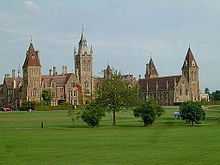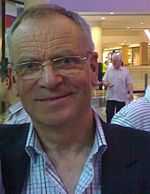Adam Raphael
Adam Eliot Geoffrey Raphael (born 22 April 1938) is an award-winning English journalist and author. In the British Press Awards of 1973, he was named Journalist of the Year for his work on labour conditions in South Africa, and he has also been a presenter and editor of BBC Television's Newsnight. Since 2004, he has edited The Good Hotel Guide. He is not to be confused with another BBC producer of the same name, Adam Jocelyn Raphael (1937–1999).[1]
Early life
The son of Geoffrey George Raphael and his wife Nancy Raphael (née Rose), Raphael was educated at two independent schools: Arnold House School in St John's Wood in north-west London, and Charterhouse School in Godalming, Surrey (where he was a contemporary of David Dimbleby), followed by Oriel College, Oxford, graduating with a BA with Honours in History.[2]
Career
Raphael undertook national service with the Royal Artillery, commissioned as a Second Lieutenant on 1 June 1957,[3] serving with the regular army until 1958 when he switched to the Territorial Army.[4] He was promoted lieutenant on 25 January 1959,[5] and completed his service in 1962.[6] He became a copy boy at the Washington Post in 1961, worked on the Swindon Evening Advertiser from 1962 to 1963, then as film critic of the Bath Evening Chronicle from 1963 to 1964.[2]
In 1965, he arrived in Fleet Street as a reporter on The Guardian, then was the newspaper's motoring correspondent from 1967 to 1968 before serving overseas as its foreign correspondent in Washington, D.C., and South Africa from 1969 to 1973. On his return to London, he was The Guardian's consumer affairs columnist from 1974 to 1976, before moving to The Observer as political correspondent, 1976–1981, and as political editor, 1981–1986.[2]
In 1984 and 1989, The Observer printed articles by Raphael which suggested that the lobbyist Ian Greer had been paying members of parliament to table parliamentary questions, an early stage of the Cash for Questions scandal.[7]
In 1987, Raphael moved to BBC Television, first as a presenter of its daily current affairs programme, Newsnight (1987–1988), then briefly in 1988 as an assistant Editor, before serving as Newsnight's Executive Editor from 1988 to 1993.[2]
In March 1989, The Observer published an article by Raphael which claimed that British Aerospace was selling Tornado aircraft to Jordan at inflated prices to include the cost of bribes. Raphael's colleague David Leigh complained to the directors of The Observer that Raphael had written it to suit Lonrho, which had a stake in British Aerospace's rival, Dassault Aviation. The MP Dale Campbell-Savours tabled motions in the House of Commons denouncing the article. The directors of The Observer dismissed Leigh's complaint, and he resigned from the newspaper in protest.
In 1989, Raphael published a book on some libel cases, My Learned Friends: an Insider's View of the Jeffrey Archer Case and Other Notorious Actions, which focussed on the remarkable case of Jeffrey Archer v. The Daily Star (1987).
In 1994, he returned to The Observer as a writer on home affairs, then went to The Economist as political correspondent, 1994 to 2004.[2] Among many influential articles Raphael has published in The Economist is Theft: Sitting on Fence,[8] which helped to popularise the Market Reduction Approach to theft – designed by Mike Sutton[9]- and revealed to the wider public the role of stolen goods markets in creating a demand for supply by theft and that the size of the stolen goods economy in Britain was £1.5 billion ($2.4 billion) annually.
In 1994, Raphael's book Ultimate Risk,[10] the story of the Lloyd's of London catastrophe, became a best-seller in the UK. Between 1988 and 1992 Lloyd's recorded losses of some twelve billion US dollars, and Raphael wrote that it thus managed to "pauperize, if not bankrupt, as many as two in five of those who provided the market's capital." Raphael was himself a Lloyd's Name, and was thus able to write as an insider, one of the victims of the affair.[11]
In 1999, Raphael wrote an article in The Economist about Jeffrey Archer's 1987 libel action against the Daily Star which raised new questions about where Archer had been on the key dates. He claimed that Archer had asked him to forget a conversation about the case and had asked him to change evidence he was about to give to the 1987 libel trial. Archer's spokesman Stephan Shakespeare replied "We are in an atmosphere where you can say whatever you like about Jeffrey Archer and it will be believed."[12]
In 2001, Raphael's knowledge of the Archer libel case became critical when Archer was tried for perjury. Raphael had decided he would not reveal a source at the trial, and told Archer so, but he also warned Archer that he would reveal his source if Archer gave false evidence, which he went on to do. Subsequently, The Mail on Sunday had to pay damages to Raphael and The Observer after an editorial by Stewart Steven attacked Raphael for revealing the source. After Archer was jailed in 2001, Steven continued to insist that Raphael had "got it wrong". In his view, journalists facing a subpoena should be prepared to go to jail to protect their sources. Raphael replied that Steven was the kind of powerful ally who had protected Archer, adding (in an editorial in The Observer) "This attack on me by one of Archer's media allies was not just defamatory but also a contempt of court".[13]
Raphael has been Editor of The Good Hotel Guide since 2004 and also an Associate Editor of Transport Times since 2005.[2]
Awards
- Granada Investigative Journalist of the Year, 1973[2]
- British Press Awards Journalist of the Year, 1973 (for a series in The Guardian on labour conditions in South Africa).[2][14]
Books
- My Learned Friends: an Insider's View of the Jeffrey Archer Case and Other Notorious Actions (London, W. H. Allen & Virgin Books, 16 November 1989)[2][15]
- Ultimate Risk: the inside story of the Lloyd's catastrophe (London, Four Walls Eight Windows, 1994)[2]
- The Good Hotel Guide 2001: Great Britain and Ireland (with Caroline Raphael) (London, Ebury Press, October 2000)
- The Good Hotel Guide 2001: Continental Europe (with Caroline Raphael) (London, Ebury Press, February 2001)
- The Good Hotel Guide 2002: Great Britain and Ireland (with Caroline Raphael) (London, Ebury Press, 6 September 2001)
- The Good Hotel Guide 2005 (with Caroline Raphael) (London, The Good Hotel Guide Ltd, January 2005)
- The Good Hotel Guide 2005: Continental Europe (with Caroline Raphael) (London, Steerforth, 15 March 2005)
- The Good Hotel Guide 2006: Great Britain and Ireland (with Desmond Balmer) (London, Steerforth, 6 December 2005)
- The Good Hotel Guide 2007 (London, The Good Hotel Guide Ltd, 2006)
- The Good Hotel Guide 2008 (with Desmond Balmer) (London, The Good Hotel Guide Ltd, 1 October 2007, ISBN 978-0-9549404-2-3)
Private life
In 1970, Raphael married Caroline Rayner Ellis, and they have one son and one daughter. In Who's Who, he gives his recreations as "tennis, golf, skiing", and his clubs as the Garrick, the Hurlingham, and the Royal Automobile Club.[2]
References
- ↑ Alex Kirby Obituary: Adam [Jocelyn] Raphael, The Independent, 14 May 1999
- ↑ 2.0 2.1 2.2 2.3 2.4 2.5 2.6 2.7 2.8 2.9 2.10 'RAPHAEL, Adam Eliot Geoffrey' in Who's Who 2008, retrieved 26 June 2008, from RAPHAEL, Adam Eliot Geoffrey
- ↑ The London Gazette: (Supplement) no. 41129. p. 4292. 19 July 1957. Retrieved 1 July 2008.
- ↑ The London Gazette: (Supplement) no. 41532. p. 6574. 24 October 1958. Retrieved 1 July 2008.
- ↑ The London Gazette: (Supplement) no. 41616. p. 640. 23 January 1959. Retrieved 1 July 2008.
- ↑ The London Gazette: (Supplement) no. 42625. p. 2316. 16 March 1962. Retrieved 1 July 2008.
- ↑ The Webs They Weave online, accessed 26 June 2008
- ↑ Raphael, A. (1998) Theft: Sitting on the Fence. The Economist. 23 May. p35.
- ↑ http://www.popcenter.org/bios/sutton
- ↑ Ultimate Risk: the inside story of the Lloyd's catastrophe (London, Four Walls Eight Windows, 1994, ISBN 978-1-56858-056-2)
- ↑ Wheatcroft, Geoffrey, Insuring Disaster, 26 November 1995. nytimes.com, accessed 26 June 2008
- ↑ New claims in Archer case, 26 November 1999, bbc.co.uk, accessed 27 June 2008
- ↑ Hodgson, Jessica, Archer's 'ally' hits back at Raphael, 27 July 2001, guardian.co.uk, accessed 27 June 2008
- ↑ Back Issues 15.04.04: NATIONAL PRESS ROLL OF HONOUR at pressgazette.co.uk
- ↑ An exposé of the British libel laws
|

